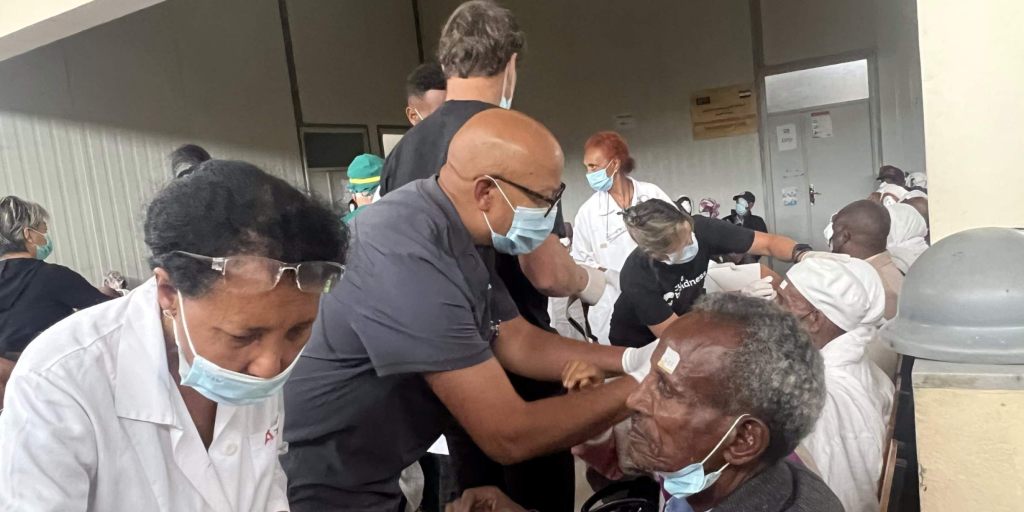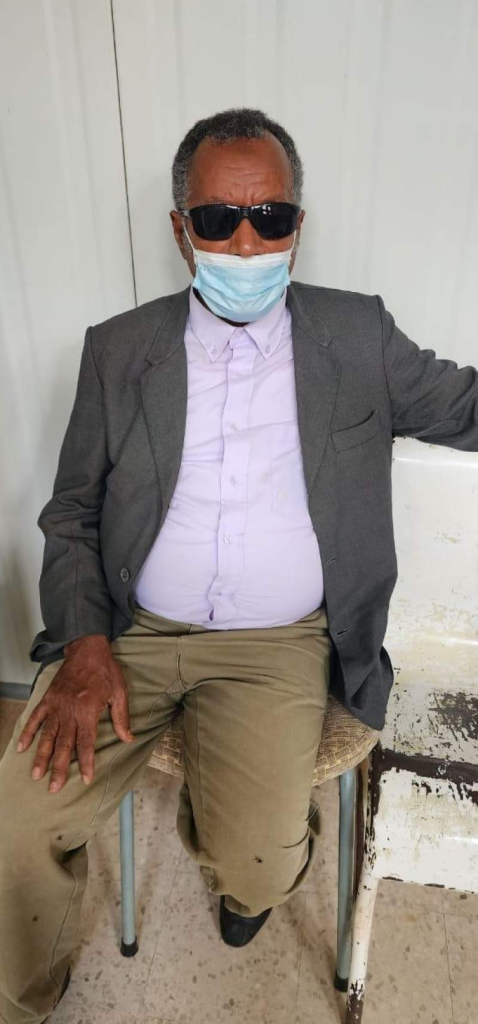
First published November 29, 2023 by HCP Cureblindness.
Salih Mohammed, 60, believed he’d be blind for life. Instead, he made history for being the first person in Eritrea to be able to see after a successful cornea transplant.
Salih was the first of four patients to receive donated cornea tissue at a high-volume surgical outreach held in partnership with Berhane Ayny Eye Hospital in Eritrea’s capital city of Asmara. In addition to the transplants, doctors completed more than 1100 sight-restoring cataract surgeries.

Eritrean HCP Board Member Dr. Menghis Bairu accompanied the volunteer team to assist with the week’s work. “This was another incredible opportunity to touch so many families. If all the words for gratitude from all the languages were to be amalgamated into one, this new word will not still be strong enough to express Eritrean patient’s and community gratitude for the life-changing outreach,” Bairu says.
“After cataracts, corneal blindness is the second most common reason that people are blind in Eritrea. When the cornea becomes opacified (typically from infection or inflammation), the only way to restore sight is a corneal transplant procedure,” explains Dr. Matt Oliva. Active with HCP since 2007, Oliva currently sits on the HCP Board and was part of the Eritrean transplant team.
Unlike a cataract surgery which has an immediate improvement in vision, a cornea transplant can take over a year to heal and requires very close collaboration between the patient and the doctor in order for the transplant to succeed. Berhane Ayny Senior Ophthalmologist Dr. Ghennet and her residents will manage the postoperative care in partnership with Oliva.
The four patients received donated corneas from the United States. Very few countries in Africa have access to cornea donations due to lack of eye banking services and not having an established culture of donation of organs.

Oliva also holds the position of Associate Medical Director for SightLife Eye Bank with a focus on international eye bank development and eliminating corneal blindness worldwide.
HCP is working directly with the Ministry of Health (MOH) in Eritrea to facilitate future transplants and cataract surgeries. “We have a very close relationship with the MOH and as their resources grow they are looking to add as many services as they can,” says Oliva, adding that the need in Eritrea for both services is high.
HCP’s approach to eye care is unique. It focuses on building local capacity, ensuring quality infrastructure and equipment are available, enabling patient care and aiding effective prevention. HCP provides training and equipment to healthcare professionals, who then go on to provide eye care services in their own communities. This action-based approach builds local leadership, empowers key actors and develops sustainable practices from the ground up.
HCP was founded in 1995 in Nepal and today works in 25 countries across South Asia and sub-Saharan Africa. HCP first came to Eritrea in 2019.
Eritrea has a population of more than 6 million. According to the Fred Hollows Foundation, most recent evidence suggests that the rates of blindness here may be among the highest in sub-Saharan Africa. Cataracts are responsible for more than half (55%) of blindness in Eritrea. Since 2019, HCP has performed more than 2400 cataract surgeries in Eritrea.
Learn more about HCP Cureblindness by visiting their website at www.cureblindness.org. To never miss a story, subscribe to their monthly newsletter. The sign-up form is on the website home page.
